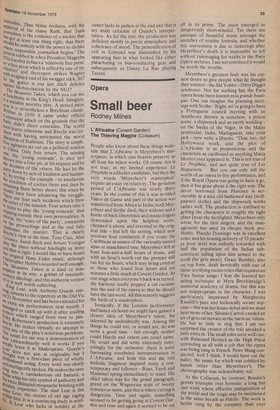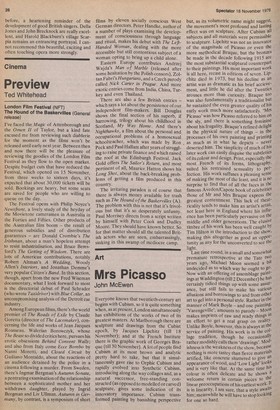Opera
Small beer
Rodney Milnes
L'Africalne (Covent Garden) The Thieving Magpie (Coliseum) People who know about these things maintain that L'Africaine is Meyerbeer's masterpiece, in which case heaven preserve us all from his minor works. Of course this is not true; in my limited experience Le Prophete is a likelier candidate, but then the very words `Meyerbeer's masterpiece require an essay on relativity. The gestation period of L'Africaine was nearly thirty years. In the course of this it was re-titled Vasco da Gana and part of the action was transferred from Africa to India; both Meyerbeer and Scribe died; their widows and a horde of hack-liberettists and musicologists descended upon the helpless score, chopped it about, and reverted to the original title but left the setting, which now involves four continents if you count the Caribbean as source of the variously named upas or manchineel tree. Meyerbeer left at least four-and-a-half hours of music, and with an hour's worth cut the premier still ran for six hours, which may bring comfort to those who found four hours and ten minutes a little much at Covent Garden. At one stage when everyone's back was turned, the baritone coolly popped a cut cavatine into the end of the opera so that he should have the last word. All this scarcely suggests the birth of a masterpiece. Ironically, if the London performance had lasted six hours we might have gained a clearer idea of Meyerbeer's talent, for talented he undoubtedly was. Among the things he could not, or would not, do was write a good tune fair enough, neither could Haydn and others one could name.
He could and did write extremely interestingly for the orchestra: there is some fascinating woodwind instrumentation in L'Africaine, and both this and the odd melodic fragment inspired many a contemporary and follower Bizet, Verdi and Massenet spring immediately to mind. His chief talent was for the grand paragraph, grand on the Wagnerian scale of twenty minutes or more, and this is where cutting is dangerous. Time and again, something seemed to be gettin'g going at Covent Garden and time and again it seemed to be cut off in its prime. The piece emerged as dangerously short-winded. Yet there are passages of beautiful music amongst the stretches of routine formula, and whether this unevenness is due to tinkerings after Meyerbeer's death it is impossible to tell without rummaging for weeks in the Paris Opera archives. I am not convinced it would be worth the trouble.
Meyerbeer's greatest fault was his earnest desire to give people what he thought they wanted the Sid Yobbo -Dirty Digger syndrome. Not for nothing has the Paris opera house been known as la grande boutique. One can imagine the planning meetings with Scribe: 'Right, we're going to have a Portuguese council meeting with an Anathema thrown in somehow, a prison scene, a shipwreck and an exotic wedding on the banks of the Niger, in the Malay peninsular, India, Madagascar, take your pick now write a libretto. 'Thus, too, did Hollywood work, and the plot of L'Africaine is as preposterous and the characters as cardboard as anything Maria Montez ever appeared in. This is not true of Le Prophete, and not quite true of Les Huguenots. But you can only tell the worth of an opera in live performance, and if the Royal Opera was going to have a go, then it has gone about it the right way. The decor borrowed from Florence is serviceable in a nice old-fashioned way (wellpainted cloths) and the shipwreck works rather well. The production is confined to getting the characters in roughly the right place (near the footlights). Meyerbeer only wrote for the best singers, and the management has used its cheque book profitably. Placido Domingo was in excellent voice and his rousing delivery of '0 paradis' (a poor aria) was unfairly rewarded with half the population of the Indian subcontinent falling upon him armed to the teeth (he gets away). Grace Bumbry, also on top form, dealt heroically with one of those terrifying mezzo roles that requires an Yma Sumac range; I fear she learned her acting technique at Myra Breckinridge's immortal academy of drama, but this was not inappropriate to the character. I was particularly impressed by Margherita Rinaldi's pure and technically secure soprano this was her house debut and we must hear more of her. Silvano Carroll exuded an air of general menace as the baritone villain. He has so little to sing that I am not surprised the creator of the role sneaked a little extra in. The small roles were well cast, with Raimund Herincx as the High Priest reminding us all with a jolt that the opera was being sung in French. Peter Maag conducted, well I think. I would have cut the ballet, the music for which was cobbled by hands other than Meyerbeer's. The choreography was indescribably naf.
At the Coliseum, by contrast, Rossini's genius triumphs over formula: a long but taut work whose effective juxtaposition of the trivial and the tragic may be mentioned in the same breath as Fidelio. The work is better sung by the company than ever before, a heartening reminder of the development of good British singers. Della Jones and John Brecknock are really excellent, and Harold Blackburn's village Scarpia remains an entrancing portrayal. I cannot recommend this beautiful, exciting and often touching opera more strongly.



































 Previous page
Previous page